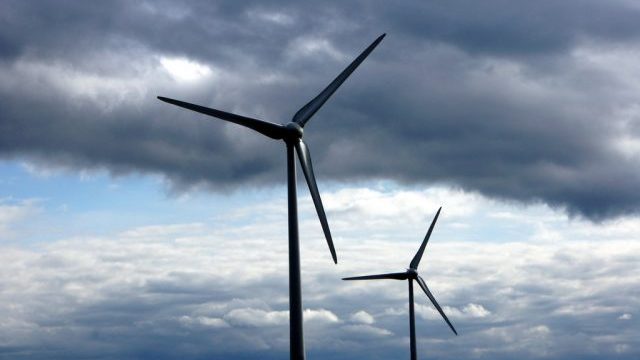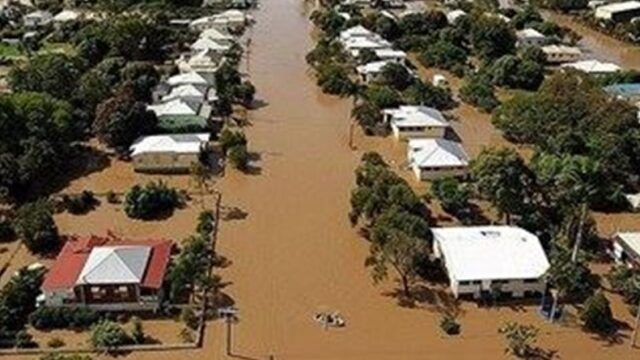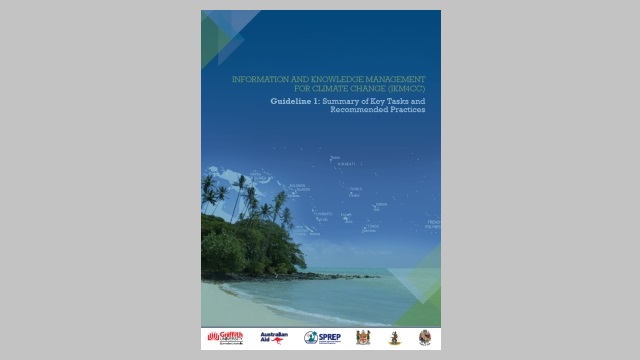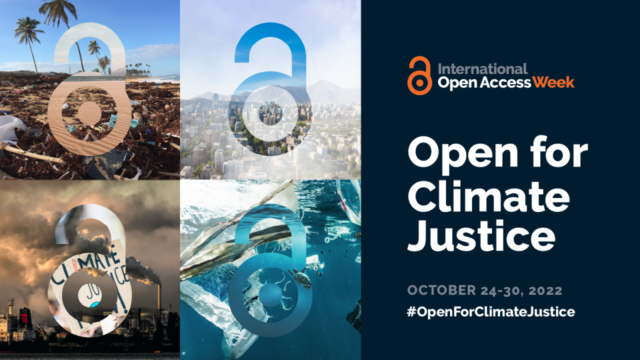
The Paris Agreement: knowledge management and climate science denial
After lengthy negotiations, it was announced on Saturday that 195 countries had adopted the Paris Agreement, a new global agreement aimed at combating climate change.
The Paris Agreement commits countries to “holding the increase in the global average temperature to well below 2 °C above preindustrial levels and pursuing efforts to limit the temperature increase to 1.5 °C above preindustrial levels”. However, the climate action plans of 186 countries published to date are insufficient to achieve this, so as detailed in the agreement all countries are asked to review their contributions every five years from 2020. They will not be able to lower their targets, rather, they will be encouraged to raise them.
Responses to the Paris Agreement have been mixed. World leaders have hailed the agreement as historic, with the outcome of the Paris talks being in stark contrast to the failed talks in Copenhagen six years ago. However, some conservation and climate action groups have labelled the Paris talks a failure, saying that the current commitments won’t prevent catastrophic climate change, and that there is no definite assurance that the increasingly ambitious targets that the agreement seeks will be delivered. Other conservation groups and commentators have taken the middle road, welcoming the agreement with cautious optimism, saying that while the agreement is significant, more needs to be done.
Writing in The Conversation, Clive Hamilton, Professor of Public Ethics at Charles Sturt University and former Executive Director of The Australia Institute, sums up the emotional tension:
If we allow ourselves to be drawn over to the everything-will-be-OK pole, we are ignoring the science and indulging in wishful thinking.
If we allow ourselves to be drawn over to the catastrophe pole, which is quite consistent with the science, then we become unable to recognise and encourage the positive steps that are being made. Three degrees is a big improvement on four, and 2.5°C is even better, even if it remains bad. But what matters most is momentum.
Tempering enthusiasm for the new agreement is the lack of meaningful climate policy progress in the 20 years since the United Nations Framework Convention on Climate Change (UNFCCC) came into force, as can be seen in the delays and policy flip-flopping that has occurred in Australia. A significant influence on this lack of progress has been climate science denial. Writing in The Conversation, Mark Beeson, Professor of International Politics at Murdoch University, alerts to the forces behind this denial:
There is little doubt there are powerful economic and political forces determined to cast doubt on the overwhelming scientific consensus about the causes and probable consequences of global warming and climate change.
As ABC journalist Annabel Crabb writes, the denial isn’t about to disappear. So, if the momentum of the Paris Agreement is to be maintained, then climate science denial needs to be overcome.
Knowledge management and climate science
What is causing climate science denial, and how can knowledge management help to overcome this problem?
The Intergovernmental Panel on Climate Change (IPCC) is a scientific body under the auspices of the United Nations (UN). It is the leading international body for the assessment of climate change:
[The IPCC] reviews and assesses the most recent scientific, technical and socio-economic information produced worldwide relevant to the understanding of climate change. It does not conduct any research nor does it monitor climate related data or parameters.Thousands of scientists from all over the world contribute to the work of the IPCC on a voluntary basis. Review is an essential part of the IPCC process, to ensure an objective and complete assessment of current information. IPCC aims to reflect a range of views and expertise.
The Fifth Assessment Report of the IPCC was completed in 2013-14, and “provides a clear and up to date view of the current state of scientific knowledge relevant to climate change”. Further, the World Bank operates the Climate Change Knowledge Portal (CCKP) as “a central hub of information, data and reports about climate change around the world”.
The lack of open access to climate science journal articles is considered an impediment to climate science awareness, but the large volume of information made available through the IPCC and CCKP is already way too much for most people to be able to absorb and understand.
So if lack of scientific information isn’t a problem, then what is causing climate science denial? While economic and political forces are influencing the denial, a sizeable proportion of the general public is choosing to doubt climate science in the face of an overwhelming body of evidence.
Fiona Cameron, a senior research fellow at the University of Western Sydney, gets to the heart of the problem in a guest editorial1 in a Special Issue of Museum and Society journal titled “Hot Science Global Citizens: The Agency of the Museum Sector in Climate Change Interventions”.
Cameron alerts that climate change is a highly complex issue:
Climate change governance agendas and strategies for action and reasons for inaction are characterized by contradictory polarities between global and local, core and periphery, states and markets, urban and rural, universalism and particularism, public and private, East and West, developed and developing, large and small, integration and disintegration.
Further, she concludes that:
Clearly climate change governance is in crisis. Current approaches to governance are inadequate and universalizing projects through the Kyoto Protocol and the United Nations Framework Convention on Climate Change based on finding consensus on acceptable levels of warming and mitigation targets has proven difficult. Intrinsic to the governing problematic are deep and intractable conflicts derived from a diversity of ideological positions, and partisan interests. Clearly, there is a requirement for complex thinking to be instituted across sectors and scales.
A critical aspect of this requirement for complex thinking is communication. In a paper2 in the same Special Issue of Museum and Society journal, Bob Hodge examines a hostile review by climate change sceptic journalist Andrew Bolt of an Australian Museum exhibition on climate change.
Hodge’s paper…
…takes both topic and attack as aspects of new conditions which science and museums alike must cope with, which include new concepts of science and society, and new communication technologies. It uses the concept of the ‘postmodern condition’ as a framework for understanding some crucial features of these new conditions. It sees traditional linear models of communication as dangerously limited ways for museums to operate effectively in this new highly complex and unpredictable environment. It finds that some aspects of this Exhibition had an underlying linearity that left it especially open to the attack it received, while other aspects incorporated an effective complexity that better fulfilled its aims.
However, Hodge alerts that this alone does not provide complete safety against such attacks. He concludes that:
I have set the analysis in a wider context because his attack was part of a wider phenomenon, and the strategic lessons are urgent and important. The complexity is irreducible, and its study cannot be deferred to a later point in a more orderly linear analysis. The problems with dealing with the global challenge of climate change are social and political as well as scientific from the outset. The social problems cannot wait till all the science is settled, not because science is consumed in a paralysing universal doubt but because science is not a single fixed body of knowledge on all aspects of this highly complex problem.
Writing in The Conversation, Andrew J Hoffman, Holcim (US) Professor of Sustainable Enterprise and Director of the Erb Institute at the University of Michigan, concurs with Hodge, stating that:
Only by broadening the scope of the debate to include this social and cultural complexity can we ever hope to achieve broad-scale social and political consensus. More scientific data can only take us so far; engaging the inherently human aspects of this debate will take us the rest of the way.
How can this be done?
Social learning is one potential approach to addressing complexity. It “brings multiple stakeholders together to provide their insights on a complex problem in order to arrive at shared solutions”, and is already being used successfully to address climate change in agriculture.
Knowledge brokering also has potential. In the lead-up to the Paris talks, the Climate Knowledge Brokers (CKB) Group released the Climate Knowledge Brokers Manifesto. The Manifesto has an emphasis on collaboration, and on communicating “ideas in the language and in the value systems of the audience”. Climate scientist Dr. Mark C. Trexler, whose experience includes being a lead author for the IPCC, welcomes the Manifesto because of its potential to break through the “cacophony of climate noise” and achieve effective knowledge transfer. However, he warns that the Manifesto doesn’t address the issue of willful ignorance, where people deliberately ignore the obvious. Perhaps the integration of knowledge brokering and social learning could overcome willful ignorance.
What do you think?
What do you think about these approaches? What other approaches do you think could be used to include social and cultural complexity in climate change and climate science communication?
Image source: Wind power by Martin Abegglen is licensed by CC BY-SA 2.0.
Journal references:
Also published on Medium.






This article is helpful to increase awareness of the importance of new KM strategies to advance climate change activities. I recommend checking the Global Solution Networks (www.gsnetworks.org) that has done a lot of research into new collaborative solutions and has also developed a good a hub of “climate and sustainability GSNs” that are categorized according to specific issues and different types of GSNs.
Tom many thanks for the information on the Global Solutions Network, I hadn’t been aware of it. There’s good information there on collaborative approaches, but I think we need to take things a step further to be able to reduce climate science denial. Most collaborative approaches assume that the targets of collaboration will be cooperative, or at least receptive to the ideas being put forward. However, this is not the case with climate science, where some people at least seriously doubt the science, sometimes to the point of hostility. The issue of the target of our communications being far more complex than we’ve been assuming is discussed in the paper by Hodge that I reference in the article. For an example of the types of approaches I think we need to explore see http://realkm.com/2015/10/29/case-study-knowledge-transfer-sharing-collaborative-learning-governance/ This work was related to sustainable landscapes rather than climate change, but as with climate science there was considerable stakeholder opposition to the initiatives that were being advanced.
Dear Bruce,
although climate change denial may be largely a matter of willful ignorance, as a matter of being “against climate change” or as a matter of denying by economic forces threatened by its truth, I am presently more worried by two other issues.
– there are at present raging strong arguments in internet discussions (for example on ResearchGate) that do not deny climate change but show calculations that natural sources of greenhouse gasses are more important than anthropogenic ones in the ratio of 80% natural and 20% caused by mankind.
However those arguing that way do not show where IPCC has been wrong, while I am not clever enough to show where they are wrong. When I asked in such a discussion about the above scientific underscoring, they fall still.
If there would be any truth in those calculations, whatever we planned to do in Paris is dwarfed by these natural causes.
– secondly I am much bothered by scores of recent individual reports on new natural sources of greenhouse gasses caused by global warming itself, with strong positive feedbacks. Melting ice releasing trapped methane, thawing permafrost releasing carbon dioxide, deeper layers of coastal waters releasing chemically methane, smoldering peat soils releasing greenhouse gasses, ocean bottoms doing so in numerous plumes that may be new due to a warming ocean floor etc. One of these was calculated with an annual amount in the same order of magnitude as the US annual contribution to increasing greenhouse gases. All these examples I read in the weekly “environmentalresearchweb” issues of the last two years or so. I now wished I had actually jotted them down (some I posted on http://www.agrometeorology.org, the website of INSAM) but scientists better placed than I am should really do new calculations on the to be expected sum of these new natural sources of greenhouse gasses, including their positive feedbacks.
Many thanks Kees for your comment. The work you’ve done with farmers looks very interesting, for example http://www.inclusiveinnovationhub.com/courses/24 Your activities look to have a strong focus on both knowledge brokering and social learning, which are the recommended approaches I discuss in the article. What has been the attitude of the farmers you have worked with to climate science? Have the farmers been more accepting of the science after you’ve engaged with them?
Yes Bruce, we (Prof. Yunita T. Winarto, an Indonesian anthropologist at the Universitas Indonesia, Depok, near Jakarta, her students and myself) have very much gone along the lines of “extension is bringing new knowledge to farmers”.
We have introduced “agrometeorological learning” as what farmers do in meetings that we call “Science Field Shops” and where we particularly have listened a lot to detail their vulnerabilities to climate. We work in coastal west Java already for more than five years and since a bit more than a year in East Lombok. In long dialogues we jointly found what knowledge these farmers need and how they can use it to build a stronger resilience to climate change. This way we came a lot closer to what knowledge farmers actually need.
Among that knowledge our monthly updated climate prediction as a “seasonal rainfall scenario” appeared increasingly successful over the past three years notwithstanding the uncertainties that we explain such predictions to have.
At the very basis of our monthly Science Field Shops is a daily rainfall measurement all farmers make in their own plots. This has been and still is a real Knowledge Transfer and Communication Technology (KTCT) for farmer communities because it shows how variable climate is in space and time. This makes it possible to warn for the expected increasing climate variability. The floods in January 2014 followed by a long advance towards the present El Nino strengthened drought we explained as an example of increasing numbers and sometimes also more serious weather and climate extreme events. This is believable because they experience it. They also therefore accept our explanations behind this climate future. We have recently posted quite a number of papers showing this approach and farmers’ acceptation in detail on ResearchGate. However, how I have to deal with the other issues in my original comment, I do not know.
It’s not entirely clear that overcoming denial is necessarily the “need” or the “possibility” when it comes to KM. If people already convinced of, or amenable to being convinced of, the need to address climate change could be gotten “the right information at the right time” there is little question but that our response to climate change would be fundamentally different. Overcoming “denial” is much more challenging.
A student of KM tools and potential for a long time, I’m intrigued by the idea that KM can help with climate change. There is the “Knowledge Networks” work that Tom refers to, and there is all of the work that the Climate Knowledge Brokers are engaged in (re the Manifesto you refer to in the piece). But at the end of the day, is it possible to get “get the right information to the right person at the right time?” It’s a huge challenge.
Using our Climate Web KM tool for climate risk, I did a webinar last week on exactly this question that is accessible here: https://www.youtube.com/watch?v=YJ5WI_4wqqo&feature=youtu.be Feedback welcome!
(BTW, if you put a website address in where it asks for it you can’t post).
Many thanks Mark for your comment. The impact of denial on climate change decision-making in Australia has been very significant, so I think that reducing it is highly desirable if possible. If I think about the people in my networks, most of those who “don’t believe in climate change” think this way because of a lack of knowledge and awareness about climate science which has left them open to influence by very vocal climate-denying politicians, media, and business representatives. Had the people in my networks had an adequate knowledge of climate science in the first place, then I think far fewer of them would have been negatively influenced. But as you say, getting the right information to the right person at the right time is a challenge. Thank you for the webinar link – I look forward to watching it and to further discussion.
Actually, the research shows that you need to treat the process of changing people’s minds quite differently depending on their perspective. A person’s level of interest (how much they know) and attachment (how much they are personally invested in that knowledge) are both very relevant in determining how to approach the problem (see https://realkm.com/2015/11/10/how-to-change-peoples-minds/).
I do think that a majority of people have low interest in climate change, but care about the impact on them. By this I mean that they don’t want to understand the mechanics.
The problem is that this makes people disproportionately likely to attach themselves to the trusted views of a third party. This trusted party should have been the scientific community, but they made a fatal flaw by conflating the reporting of climate science with their preferred policy response. (Although it was well-intended, I believe that Gore made this problem worse by associating himself — as a prominent politician — with the science of climate change.)
When you advocate a particular policy response, you are no longer a scientist but a lobbyist. And the views of lobbyists in today’s media-savvy world are treated with extreme suspicion.
The key communications challenge for the scientific community is how to either re-establish trust with the community, or to find another party with trusted credentials to provide an independent evaluation. This doesn’t mean that existing communication efforts should stop, but a good start would be for the scientific community to stop talking about policy responses.
Even still I could see the benefits in getting an independent evaluation by a credible body — which in Australia probably means the Productivity Commission.
Thanks Stephen for your comment. Yes, the scientific community conflating the reporting of climate science with their preferred policy response is a critical issue. Andrew Campbell discusses it in the opinion piece “From advice to advocacy: scientists in the political arena” – http://www.abc.net.au/news/2013-03-15/campbell-scientists-in-the-political-arena/4574478
Illustrating the danger of scientists crossing the line between analysis and advocacy is the “gloom and doom” aspect of many of the advocacy positions. Underpinning them is the notion of collapse: the “belief in a mythical time when humanity lived in harmony with nature” and “the idea of overshoot, the metaphor that humanity is hurtling down a road at 100 km/hr towards a cliff” – http://theconversation.com/want-to-save-the-environment-lets-leave-the-collapse-porn-under-the-mattress-51575
This “collapse” approach just alienates and disempowers people. It has also led to the drawing of wrong conclusions, for example as discussed in http://realkm.com/2015/11/03/collapse-of-the-easter-island-ecocide-theory/